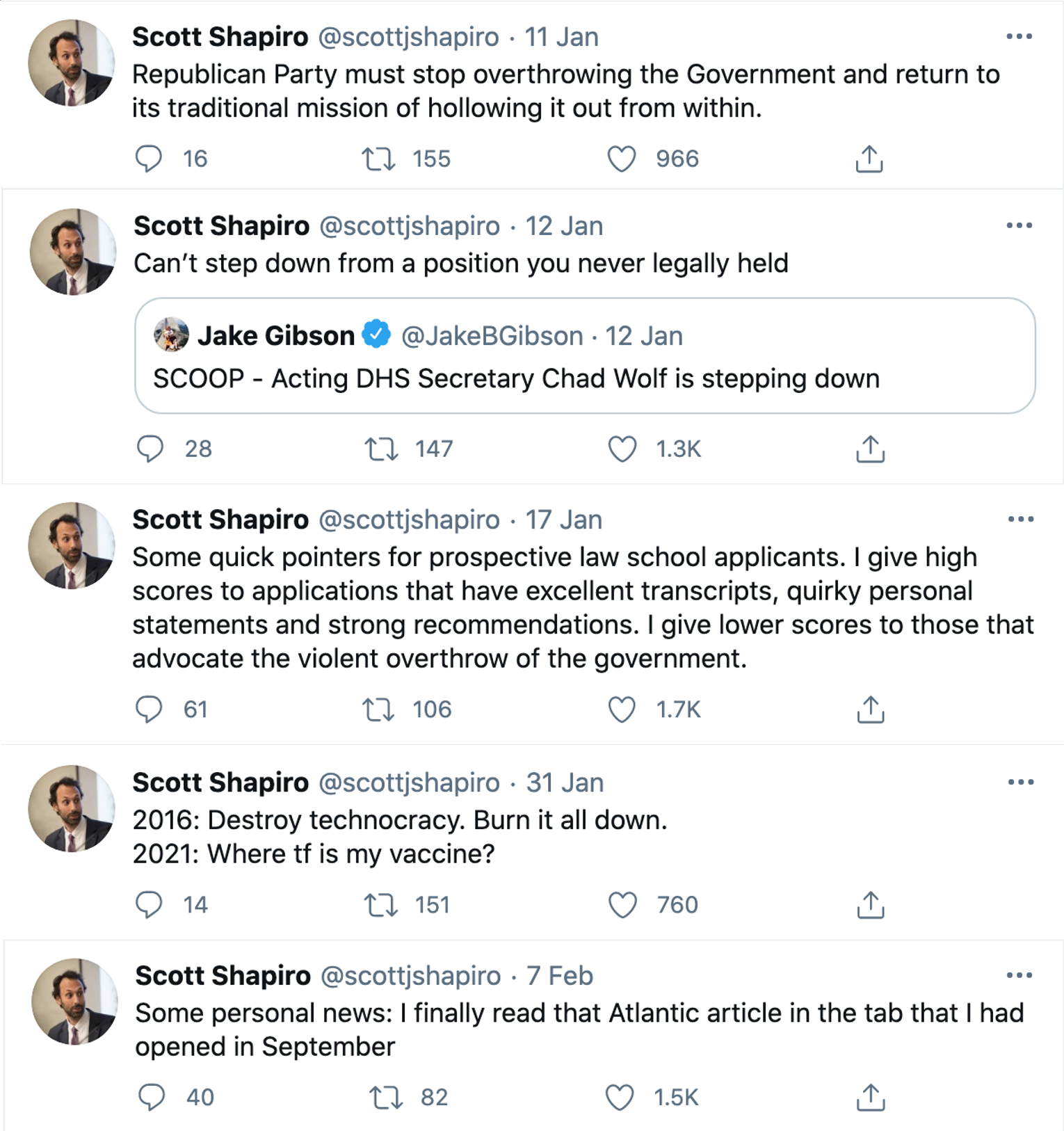
Ryan Chiao, Photo Editor
One day, Scott Shapiro LAW ’90, professor of law and philosophy, was walking home from a convenience store when he saw a bird smash into a bodega window. “I thought, oh my God, do I feel like that bird,” Shapiro said. “And I thought, oh, I’ll tweet that.”
Thus began Shapiro’s growing popularity on Twitter, where he currently boasts over 55,000 followers. Shapiro tweets “what comes into [his] head,” which includes mocking obscure theories like legal positivism, stringing along a catfisher named Selena over a dayslong romance to being quote-tweeted by Julia Louis-Dreyfus, which made him “really happy.” Shapiro — catfisher, bird-flying-into-window-identifier and all-around Twitter extraordinaire — is just one of many Yale professors who have cultivated large followings on the app.
“I mean, partly I think because there’s a kind of spectacle about a Yale Law professor acting like a total jackass,” Shapiro told the News of his Twitter popularity.
Some of the professors on Twitter have, at one point, posted a handful of viral tweets, been at the center of some sort of Twitter drama or entered a prolonged fight with another user — which sometimes happens to be a different Yale professor. The News talked to four of those professors — each of whom have tens of thousands of followers and very active Twitter presences — about what makes the app so worthwhile, as well as whether their usage has ever raised eyebrows with administrative officials.
Notably, three of the four professors felt as though their Twitter usage did not intersect with their more traditional teaching duties at Yale. For example, Jason Stanley, professor of philosophy, considers his Twitter and professorial worlds as “two different lives.” He characterizes his life at Yale as more private, while his Twitter is “public intellectual work.”
“It never occurs to me and I’m always shocked to find that some Yale student follows my Twitter,” Stanley told the News.
Of the four professors interviewed, Stanley was one of the most active, with over 43,000 tweets and 75,000 followers. Many of those tweets are dedicated to disagreements with other posts and opinions on Twitter.
Of his frequent conflicts with other tweeters, Stanley acknowledged that he’s “an argumentative sort” and therefore does not shy away from engaging with posts about which he disagrees. But in general, he tries to “stay away from the game that is Twitter.”
“I’m a philosopher and philosophers argue with people,” Stanley told the News. “So, you know, when a random person on Twitter says something I disagree with, sometimes I forget myself, and I try to politely engage them. It took me a little while to learn that if they have 13 followers and they’re insulting you, then you should not.”
Nicholas Christakis ’84, professor of social and natural science, who has over 180,000 followers and a coveted blue check mark on his account, did not comment directly on whether Twitter affects how he teaches, but he did note that Twitter is a “powerful tool,” particularly in advancing the public’s understanding of a specific area. Christakis cited viral threads early on in the pandemic about what COVID-19 was and what was happening.
He added that Twitter helps inform him about developments in a variety of fields pertinent to his research.
“In a way, the use of Twitter can serve an altruistic function, allowing us to educate each other,” Christakis said.
Shapiro is another active Twitter user, also with over 40,000 tweets. Unlike Stanley, however, Shapiro has found Twitter to intersect “in several ways” with his work as a professor.
He noted that needing to fit into the Twitter character count has caused his writing in general to become clearer and that, from being on Twitter so much, he is interacting with a new set of law professors and philosophers beyond just his Yale colleagues.
“The good, bad thing [about being active on Twitter] is that then people start asking you questions, or emailing you ‘can you clarify this when you meant that’ and that’s great because that’s why you’re doing it. On the other hand,” Shapiro continued, “you also have students. You’re supposed to respond to them. It has increased the amount of time that I teach, in some strange way, but it’s very fulfilling.”
Professor of jurisprudence at Yale Law School Samuel Moyn — who disagrees with the characterization of his follower count as “large” but still boasts over 32,000 followers — considers his Twitter a megaphone for scholarship and other thoughts that he believes deserve attention. Still, he acknowledged that “sometimes I can’t help myself” and also chimes in on whatever is “the latest outrage.”
Moyn called his Twitter “an expanded Facebook” that allows him to keep in touch with his network, as well as share information.
“I am not trying to be an ‘influencer,’” Moyn told the News, “though I am thrilled some colleagues succeed in this regard.”
None of the professors told the News that the Yale administration has ever taken issue with their active social media presences, though Shapiro and Stanley both spoke of instances in which they have gotten “in trouble” on the app itself and angered other tweeters from their remarks. When asked about whether or not he has personally experienced that, Stanley laughed.
“You’re not actually on Twitter if your tweets haven’t gotten you in trouble,” he said.
But Stanley spoke highly of Yale’s efforts to protect his and others’ rights on the app, as well as their free speech rights more generally.
“I’m sure I’ve tweeted things that if I were at an institution that didn’t protect the free speech rights of their professors, when I’m challenging the president of the United States, or calling people fascists, that would get you in trouble at a university that didn’t protect your free speech rights,” Stanley said. “But Yale has been a great protector of my free speech rights, of the free speech rights of other faculty.”
The Yale University Twitter account has 556,000 followers.
Madison Hahamy | madison.hahamy@yale.edu








